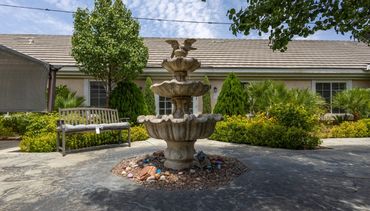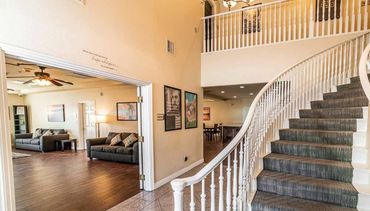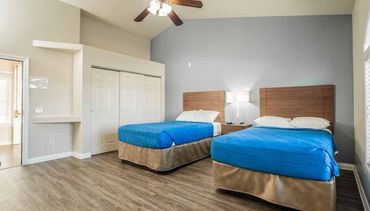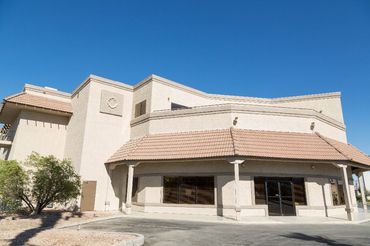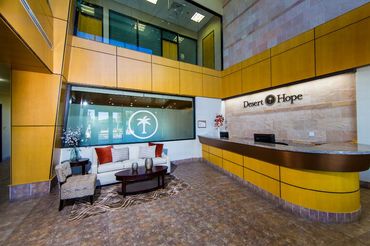
Drug & Alcohol Rehab Centers near Clark County, NV
Inpatient Substance Abuse treatment programs in Nevada
If you are struggling with a drug or alcohol addiction in Clark County, Nevada, you can find help from Rehabs.com. We offer valuable information about high-quality drug and alcohol treatment centers. You can find information on both outpatient and inpatient drug and alcohol rehabs near Clark County, Nevada, that have the treatment programs that will help you or your loved one start working on your sobriety. Search Rehabs.com to locate the addiction treatment program in Clark County that will provide the alcohol or drug abuse program that most effectively meets your needs. A Clark County substance abuse facility can help you or your loved one begin on your path toward recovery.
Treatment Centers near Clark County, NV
All Treatment Centers near Clark County, NV
- Las Vegas Rehabs
- Reno Rehabs
- Elko Rehabs
- North Las Vegas Rehabs
- Henderson Rehabs
- Fallon Rehabs
- Carson City Rehabs
- Dayton Rehabs
- Sparks Rehabs
- Pahrump Rehabs
Information About Rehab in Clark County
Inpatient vs Outpatient
Outpatient and Inpatient Facilities
Getting the right treatment in Clark County, NV, is vital for a successful recovery. Some people thrive best in an inpatient drug rehab center. When you are admitted to residential rehab treatment, you live at the facility throughout the treatment process—whether it be 30, 60, or 90 days. Both inpatient drug rehabs and inpatient alcohol rehab centers provide 24/7 monitoring and close oversight from certified therapists and staff. People with a serious addiction may require inpatient, residential treatment for safe detox.
Other people can safely stop using drugs by attending an outpatient drug rehab center. Outpatient programs are helpful for those who are not seriously addicted or who have already completed a residential program and want to maintain sobriety. Outpatient alcohol rehab centers are available for people looking to abstain from alcohol use.
What is the Difference?
There is a difference between inpatient and outpatient rehab treatment programs. Not only is the treatment slightly different, but the duration and approach differ too. Inpatient and outpatient programs are designed to meet different addiction needs. Highlights of an inpatient treatment center might include:4
- Intensive care.
- Certified, licensed therapists.
- Residential facilities and accommodations.
- Medical assistance, if needed.
Outpatient drug rehab will have certified therapists, but you will come and go on a more flexible schedule. Outpatient rehab focuses on therapies such as cognitive-behavioral therapy, family therapy, motivational interviewing, and more.4
When considering inpatient vs. outpatient drug rehabs, it’s helpful to have a medical professional evaluate your needs to see which program is best for you.
Latest Reviews
Latest Reviews of Rehabs in Nevada
WestCare Nevada
Great Counselor's but food was not the best. They make you feel welcome and not like you are a disgrace to the outside world and that your life does mean something.
HELP of Southern Nevada - Shannon West Homeless Youth Center
I feel at the end the person must form there own strength which is hard sticking to the program.
Desert Hope Treatment Center
They use group therapy here. It was cool and helpful to see so many people in similar situations.
More Info
Clark County, Nevada Substance Abuse Statistics
In 2019, 7.44% of adults in Nevada had a substance use disorder (SUD). This rate is slightly less than the national average of 7.93%.1 Here are some further details of the drug and alcohol abuse in the state.
Drug Abuse in Clark County, Nevada
Of the approximately 300,00 people who need treatment for illicit drug use or substance use, 12.37% have not sought help at an inpatient rehab facility.2 The estimated use of various substances by people in Nevada in 2019 is reported below. These numbers reflect estimates (in thousands) for people ages 12 and older who reported using the substance in the past year:2
- 5,499 reported use of cocaine in the past year.
- 776 reported use of heroin in the past year.
- 9,836 reported use of prescription drugs in the past year.
- 1,933 reported use of methamphetamine in the past year.
- 20,331 people have indicated that they have had an SUD in the past year.
Among residents of Clark County, Nevada, an estimated:3
- 26 % reported the use of cocaine in the past year.
- 37 % reported the use of heroin in the past year.
- 86 % reported misuse of prescription drugs in the past year.
- 17 % reported the use of methamphetamine in the past year.
- 34 % have an SUD.
Alcohol Abuse in Clark County, Nevada
Alcohol use is prevalent just about everywhere, including Nevada. The following numbers are estimates (in thousands) for people ages 12 and older who reported using alcohol as indicated in the past month:2
- 139,783 people reported using alcohol.
- 66,453 people reported binge drinking.
- 14,661 people indicated that they have an alcohol use disorder (AUD).
Among residents of Clark County, Nevada:3
- 33% reported the use of alcohol in the past month.
- 38% reported binge drinking in the past month.
- 55% have alcohol use disorder.
How to Find the Best Rehab Facility Near Me
You can find the best-rated rehab centers near you by following these tips:
- Use reviews and feedback online to find top-rated rehab centers near you.
- Ensure the rehab is licensed and uses certified therapists.
- Verify that the program is specifically tailored to treat the substances being abused.
- Do not rely on high-risk strategies for withdrawal and detox, including rapid detox.
- Ensure the program focuses on the lifestyle, emotional, and psychological factors that have contributed to the SUD
- Verify that the program caters to a wide range of groups, including women, veterans, LGBTQ, and those with co-occurring disorders.
30 Day Inpatient Rehab Programs
When it comes to inpatient treatment programs, a 30-day drug rehab or 30-day alcohol rehab program has you live at the treatment facility (anywhere between 28-20 days). While you are in treatment, you will attend individual and group therapy sessions, participate in 12-step or other support group meetings, and learn relapse prevention techniques to help you remain sober once you return home.
Thirty-day drug rehab programs can be a good beginning point for those who are struggling with drug or alcohol addiction. While it may feel overwhelming to commit to a long period of treatment, 30 days may feel short enough that patients are more willing to commit to rehab. In addition, a 30-day treatment program gives patients the time they need to go through detox and begin to address the underlying issues that contributed to their substance abuse. This allows them to being living a sober lifestyle that they can continue working on after the complete treatment.
90 Day Inpatient Rehab Programs
Ninety-day treatment programs include intake and evaluation, detox, therapy, self-help groups, and aftercare. A 90-day drug rehab or 90-day alcohol rehab program may provide patients with the time they need to learn and develop habits and strategies that they can use as they pursue recovery after treatment. It can take time to develop habits and learn skills, and 90-day treatment programs may provide the needed time a safe and supportive environment.
Long-term treatment programs are also a good option for those who have a long-standing substance abuse issue, have relapsed, or feel that they need more time to work on the skills they need to support their recovery.
How to Find Dual Diagnosis Rehab Centers In Clark County
A dual diagnosis disorder is when someone has a mental health disorder and SUD simultaneously. For example, having substance abuse and depression or substance abuse and anxiety would be a dual diagnosis and require dual diagnosis treatment.
Some rehabs are not equipped to deal with mental health issues, so it’s vital that you look for dual diagnosis rehab centers when searching for the perfect rehab in Clark County. Desert Hope Treatment Center, one of AAC’s facilities, offers a well-rounded dual diagnosis program.
How to Pay for Substance Abuse Treatment
Although addiction treatment can be very expensive, there are various ways to pay for treatment. Many people pay for alcohol and drug rehab with private insurance. However, there are other options that may help you obtain the treatment you are looking for, including grants, scholarships, sliding pay scales, and payment plans. There are also state and federally run facilities that can provide treatment. Don’t let the fear of the price of rehab stop you from pursuing the care, support, and treatment that you need.
Medicaid Coverage for Drug and Alcohol Addiction Treatment
Medicaid is the largest healthcare insurance program in the country.5 It is a joint federal and state program that provides free or low-cost insurance coverage to low-income applicants who are 65 or older, 19 or younger, pregnant, disable, or caring for a child.5
The Affordable Care Act (ACA) expanded eligibility for Medicaid coverage to include other groups and income levels, depending on your state.
Medicaid does typically cover drug and alcohol rehab treatment. Medicaid rehab coverage may vary depending on a person’s particular insurance plan. The costs associated with substance abuse and addiction treatment may vary between Medicaid health insurance members by state
Medicare typically covers the cost of alcohol and drug addiction treatment, but coverage may vary depending on your individual insurance plan. In addition, costs associated with addiction rehab may vary based on the state of residence for the Medicaid insurance member.
Insurance Coverage for Drug and Alcohol Addiction Treatment
The Affordable Care Act (ACA), passed in 2010, requires that all health insurance providers must provide coverage for addiction treatment services. Insurance plans must provide coverage for mental health services, including addiction treatment.
Depending on your state and your health plan, specific behavioral health benefits may vary. Insurance companies cover part or all of the costs of rehabilitation, so coverage may vary.
Getting Rehab Treatment Without Insurance
There are low-cost, and even free, treatment programs for those who do not have insurance. Many states provide funding for rehab services that can be accessed by those with no insurance or income. There are also scholarships that may be available at individual treatment facilities. Some facilities may be open to establishing a payment plan that allows you to pay off your treatment over time. In addition, there are certain organizations that provide assistance to those who have no insurance but are seeking alcohol or drug addiction rehab.
Not having insurance does not mean you cannot obtain treatment for substance abuse.
What Substance Addiction do Rehab Facilities Offer Treatment For?
Alcohol or drug addiction may involve the misuse of various substances. When patients look for help, they may be pursuing:
There are treatment facilities in Dallas County and beyond that provide treatment for various drug addictions.
Cities in Clark County, Nevada
Rehabs.com is here to assist you on your journey to recovery by helping you find top-rated treatment facilities and programs to assist with substance abuse issues. Reach out for help today.
Sources
- State of Nevada. (2019). Governor’s Commission On Behavioral Health.
- Substance Abuse and Mental Health Services Administration, Center for Behavioral Health Statistics and Quality. (2021). National Survey on Drug Use and Health, 2018 and 2019.
- Substance Abuse and Mental Health Services Administration, Center for Behavioral Health Statistics and Quality. (2018). National Survey on Drug Use and Health, 2016, 2017, and 2018.
- National Institute on Drug Abuse. (2019). Treatment Approaches for Drug Addiction DrugFacts.
- Medicare.gov. (n.d.). What’s Medicare.
Popular regions and counties in Nevada
You can also view rehabs in Nevada, cities in Clark County and other by popular counties, cities and regions from the listing pages below.
- Battle Mountain
- Beatty
- Blue Diamond
- Boulder City
- Caliente
- Carson City
- Denio
- Elko
- Ely
- Fallon
- Fernley
- Gardnerville
- Henderson
- Incline Village
- Indian Springs
- Las Vegas
- Laughlin
- Mesquite
- Minden
- Nellis AFB
- North Las Vegas
- Overton
- Pahrump
- Paradise Valley
- Reno
- Searchlight
- Silver Springs
- Sparks
- Spring Creek
- Tonopah
- West Wendover
- Winnemucca
- Yerington
Popular Rehab Treatment Locations
If you’re willing to travel, below are some of our popular listings by State.
